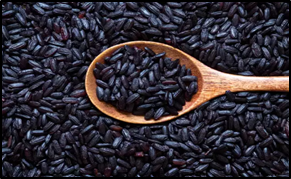Kalanamak rice, ‘Buddha’s gift to people’, is now small, strong
Oct. 30, 2022
In News:
- Kalanamak, a traditional type of rice with a black husk and a powerful fragrance, is about to get a new look and name.
- The rice is thought to have been a gift from Lord Buddha to the people of Sravasti (capital of the ancient Kosala) following his enlightenment
- Addressing the problem of lodging, the Indian Agriculture Research Institute (IARI) has successfully developed two dwarf varieties of Kalanamak rice, named Pusa Narendra Kalanamak 1638 and Pusa Narendra Kalanamak 1652.
What’s in today’s article:
- About the Kalanamak rice
- News Summary
Kalanamak rice:

- Also known as Buddha Rice, Kalanamak is a scented, one of the finest and short grain rice with an unusual black husk (kala = black; namak means salt).
- It is currently grown in 11 districts of the Terai region of northeastern Uttar Pradesh and in Nepal (specifically Kapilvastu).
- This rare rice has been awarded the Geographical Indication (GI) tag in 2013 which recognised Siddharthnagar and the adjacent districts for the tag.
- Under the One District One Product (ODOP) Scheme, it has earned the Prime Minister's award for Excellence in Public Administration 2021.
- It was featured in the book 'Speciality Rices of the World' by the Food and Agriculture Organization (FAO) of the United Nations.
Benefits:
- This rice is rich in micronutrients such as iron and zinc and can help prevent Alzheimer’s
- It also contains 11% protein which is almost double of common rice varieties.
- Besides, it has a low Glycemic Index (49% to 52%) making it sugar free and suitable for even diabetic people.
- It also contains antioxidants such as anthocyanin which is useful in preventing heart disease and also helps in improving the health of the skin.
- It has also been found helpful in regulating blood pressure and blood-related problems.
Indian Agricultural Research Institute (IARI):
- Commonly known as the Pusa Institute, IARI is India's national institute for agricultural research, education and extension.
- The current institute in Delhi is financed and administered by the Indian Council of Agricultural Research (ICAR).
- The ICAR is an autonomous body responsible for coordinating agricultural education and research in India.
- It reports to the Department of Agricultural Research and Education, Ministry of Agriculture and the Union Minister of Agriculture serves as its president.
- It is the largest network of agricultural research and education institutes in the world.
- The IARI was responsible for the research leading to the "Green Revolution in India" of the 1970s.
News Summary:
Problems faced by the traditional variety:
- Tall and prone to lodging - a reason for its low yield:
- Lodging is a condition in which the top of the plant becomes heavy because of grain formation, the stem becomes weak and the plant falls on the ground.
- As a result, the yield dropped dramatically (2-2.5 tonnes per hectare), as did the market for rice.
- Attack of blight bacterial disease.
The dwarf varieties (Pusa Narendra Kalanamak 1638 and 1652) by IARI:
- The plan was to combine the high yielding properties with the quality of traditional Kalanamak.
- In that process (started in 2007), the breeding programme was conducted by bringing the dwarfing genes from the rice varieties Bindli Mutant 68 and Pusa Basmati 1176, after crossing it with Kalanamak.
- The objective was to bring dwarfness into the variety and make the plant sturdy to prevent lodging. Attack of blight bacterial disease has also been addressed by inducting blight tolerant genes.
- The new name is in recognition of the association the institute has with the Acharya Narendra Dev University of Agriculture and Technology in Ayodhya, where the two varieties were tested.
- The new breed has a stronger aroma and superior nutritional characteristics. Productivity has increased to 4.5 to 5 tonnes per hectare, up from 2.5 tonnes in traditional Kalanamak.










